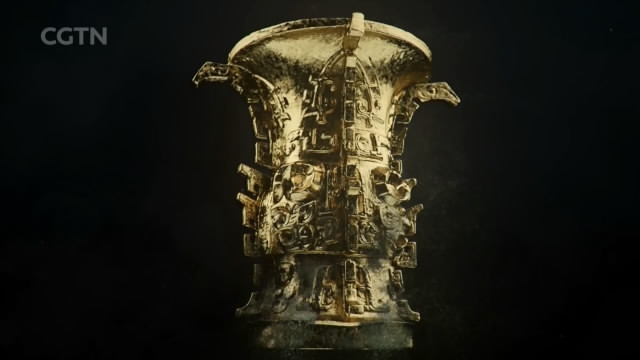
11:06, 18-Apr-2018
If Treasures Could Talk: What secrets would He's zun reveal?
05:26

Time to check out some of China's most valuable ancient treasures. Today we continue our special series "If Treasures Could Talk," and present to you"He's Zun". The bronze zun was forged by He in return to his cousin, Cheng, also the King of Zhou. Feats of King Cheng's, He's and ancestors' are inscribed on the zun. Among all the inscriptions, Zhongguo was first recorded use which is the modern Chinese word for China.
You have a new message from an ancient treasure.
This imposing, richly-ornamented figure hides a secret that only the wise can interpret. This national treasure tells of two young hearts beating in unison, and of a state remaining true to its aspirations.
At sunset three thousand years ago, two youths watch their shadows lengthening. One of them would build a city that prospers to this day. The other would forge a bronze vessel that has survived a dozen dynasties. Their fathers had fought together to establish a new dynasty: Zhou.
One of the young people was the new king, Cheng of Zhou. The other was He, his cousin. King Cheng began building a new capital city.
The new king was ten years old when he ascended the throne. But he was fortunate, because he had the support of his uncle, the Duke of Zhou, a man later praised by Confucius himself for his statesmanship. Following the last wishes of the old king, King Cheng moved his capital the three hundred kilometres from Xi'an to Luoyang.
The young He shared the new king's vision. His father had served the old king well, and he wanted to do the same for his successor. He obtained permission to forge a bronze zun. On it, he had inscribed the feats of King Cheng's, and his own, ancestors, and of King Cheng himself.
The 122-character inscription contains the phrase zhai zi zhong guo. This provides the answer to an ancient question. This is the first recorded use of Zhonggguo, the modern Chinese word for China. Zhai zi means 'to live here'. Banners raised around a city form a zhong, - or 'centre'.
Combining 'river' and 'soldier' forms guo, the word for country. 'Zhongguo' referred to the centre of the kingdom. The new capital, Chengzhou, lay near today's Luoyang. Dedicated to He's ancestors, these words convey a message to Chinese people today.
Over the next three thousand years, as dynasties rose and fell, the word Zhongguo evolved to mean a geographical, political, and cultural centre.
By the late 19th century, the word was appearing in official documents as the country's name. Those youthful shadows disappeared long ago. But Luoyang is still prospering.
In 1963, He's gift to the king was unearthed from a hill in Shaanxi province. It may have lost its original sheen, but the 122 characters inscribed on it can still be read. They relate tales of the feats performed by He's forefathers.
Three thousand years ago, the word zhongguo was buried deep in the earth. When it again saw the light of day, its meaning had expanded to cover 9.6 million square kilometres of that same earth.

SITEMAP
Copyright © 2018 CGTN. Beijing ICP prepared NO.16065310-3
Copyright © 2018 CGTN. Beijing ICP prepared NO.16065310-3